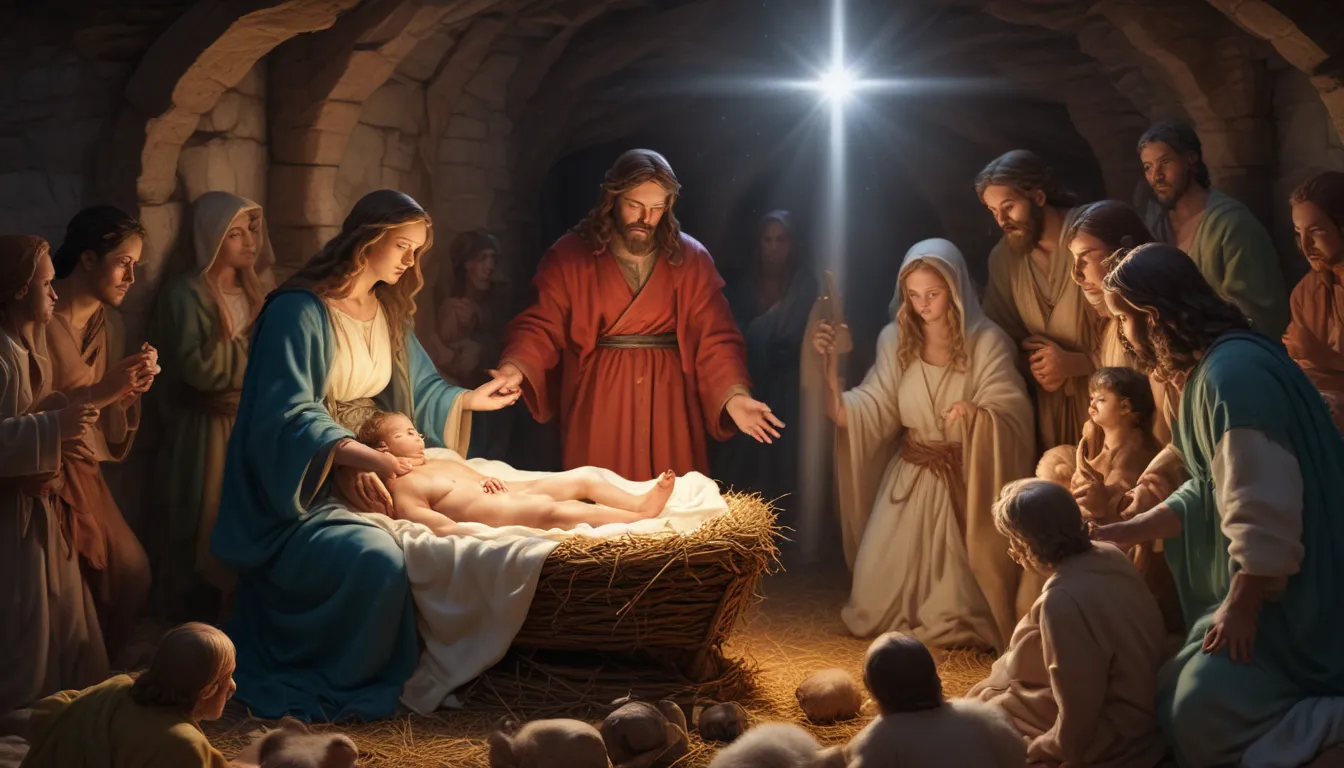The images in our articles may not match the content exactly. They are used to grab your attention, not to show the exact details in the text. The images complement the text but do not replace it.
The birth of Jesus Christ holds a significant place in Christian theology, serving as a cornerstone of faith and hope for millions around the world. This miraculous event not only marks the incarnation of the Son of God but also carries profound historical, cultural, and religious significance. In this article, we will delve into 19 fascinating facts about Jesus’ birth, shedding light on the historical context, fulfillment of prophecies, and the universal message of love and salvation that it embodies. Join us on a journey through the annals of history and faith as we uncover the remarkable details surrounding the birth of Jesus Christ.
Key Takeaways:
- Jesus’ birth in Bethlehem: Fulfilling ancient prophecies, marking the beginning of a new era of hope and salvation.
- Jesus’ universal message: Inviting everyone to experience God’s love and grace, fostering unity, peace, and spiritual renewal.
The Historical and Prophetic Context:
Jesus was born in Bethlehem:
The small town of Bethlehem, located in modern-day Palestine, is the renowned birthplace of Jesus. This significant event took place in a humble setting, fulfilling the prophecy of the Messiah’s arrival in the city of David.
Fulfillment of ancient prophecies:
The birth of Jesus fulfilled numerous prophecies recorded in the Old Testament, validating his divine purpose and the fulfillment of ancient promises.
Journey to Bethlehem for a census:
Mary and Joseph traveled to Bethlehem to comply with the Roman census, a pivotal event that led to the fulfillment of the prophecy regarding the birthplace of the Messiah.
The Miraculous Nativity:
Jesus was born in a manger:
The Son of God was born in a manger, a humble feeding trough for animals, as there was no room for them in the inn. This modest beginning symbolizes Jesus’ identification with the lowly and his mission to bring salvation to all.
Angels announced Jesus’ birth to shepherds:
Angels appeared to shepherds in the fields, proclaiming the joyous news of Jesus’ birth and heralding the arrival of the long-awaited Savior.
The wise men followed a star to find Jesus:
Guided by a miraculous star, the wise men embarked on a journey to pay homage to the newborn King, symbolizing the universal significance of Jesus’ birth.
The Divine Plan and Human Response:
King Herod sought to kill the infant Jesus:
Upon learning of Jesus’ birth, King Herod, driven by fear and insecurity, sought to eliminate the perceived threat to his reign by ordering the massacre of male infants in Bethlehem.
Celebration of Jesus’ birth on December 25th:
The date of December 25th has been traditionally recognized as the commemoration of Jesus’ birth, although the precise historical date remains a topic of scholarly debate.
The Spiritual Significance and Symbolism:
The name “Jesus” means “God saves”:
The name “Jesus,” derived from the Hebrew name Yeshua, carries profound significance, signifying the mission and purpose of his life—to bring salvation and redemption to humanity.
The central role of Jesus’ birth in the Christian faith:
The birth of Jesus holds paramount importance in the Christian faith, serving as the foundation of the belief in God’s incarnation and the embodiment of divine love and grace.
The source of hope and joy in Jesus’ birth:
The birth of Jesus brings hope and joy to people worldwide, symbolizing the promise of redemption, peace, and eternal life for all who believe in him.
Traditions and Commemoration of Jesus’ Birth:
The significance of Jesus’ birth in traditions:
The celebration of Jesus’ birth is marked by diverse traditions, including the decoration of Christmas trees, the exchange of gifts, and the retelling of the Nativity story.
The portrayal of Jesus’ birth in the Nativity scene:
The Nativity scene, a cherished symbol of Christmas, portrays the birth of Jesus in a stable, surrounded by Mary, Joseph, shepherds, and the adoring Magi.
Impact and Relevance of Jesus’ Birth:
The testament to God’s faithfulness in Jesus’ birth:
The birth of Jesus exemplifies God’s faithfulness in fulfilling His promises, demonstrating His unwavering love and commitment to humanity.
The universal message of Jesus’ birth:
The impact of Jesus’ birth transcends cultural and geographical boundaries, resonating with people of diverse backgrounds and beliefs, uniting them in the spirit of love and compassion.
Inspiration for kindness and generosity:
The story of Jesus’ birth inspires acts of kindness, compassion, and generosity, prompting individuals to extend goodwill and support to those in need, reflecting the essence of the Christmas season.
The Everlasting Promise of Jesus’ Birth:
The dawn of a new era of hope and salvation:
The birth of Jesus marks the dawn of a new era, offering hope, forgiveness, and reconciliation to all who embrace the message of his birth and the redemptive power of his life.
Invitation to experience God’s love and grace:
The birth of Jesus extends an invitation to all to experience the transformative gift of God’s love and grace, fostering a sense of unity, peace, and spiritual renewal.
In conclusion, the birth of Jesus is not just a historical event but a profound symbol of hope, love, and salvation. As we reflect on the 19 fascinating facts about Jesus’ birth, we are reminded of the universal message of compassion, forgiveness, and redemption embodied in the birth of the Savior. The celebration of Christmas, commemorating this miraculous event, remains a cherished tradition that fosters unity, compassion, and goodwill among diverse communities. The timeless significance of Jesus’ birth continues to inspire and resonate with millions worldwide, offering a message of peace and redemption that transcends time and culture.
FAQs:
Q: What is the significance of Jesus’ birth in Christianity?
A: The birth of Jesus is central to Christian belief, signifying the fulfillment of prophecies and the arrival of the long-awaited Messiah, who would bring salvation and eternal life to humanity.
Q: How is the birth of Jesus celebrated?
A: The birth of Jesus is celebrated through the observance of Christmas, marked by religious services, festive gatherings, gift-giving, and acts of charity, emphasizing the values of love, generosity, and compassion.
Our commitment to delivering trustworthy and engaging content is at the heart of what we do. Each fact on our site is contributed by real users like you, bringing diverse insights and information. Our dedicated editors ensure the highest standards of accuracy and reliability, guaranteeing that the facts we share are fascinating and credible. Trust in our commitment to quality and authenticity as you explore and learn with us.
Let the miraculous birth of Jesus continue to inspire and unite us in the spirit of love, hope, and faith.






